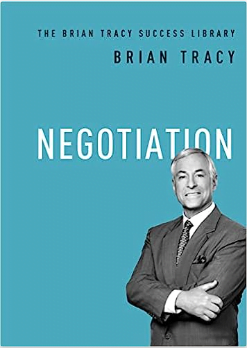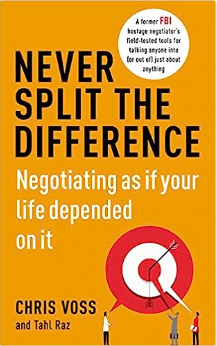According to, Harvard Business School Professor Michael Wheeler, “Enhancing your negotiation skills has an enormous payoff.” Prof. Wheeler emphasizes that learning these skills enables you to secure agreements that might have otherwise eluded you. Moreover, it empowers you to expand the scope of potential benefits, creating additional value from the agreements you do reach. Additionally, proficient negotiation skills can help you prevent minor disagreements from escalating into major conflicts.
In this article, we will explore the art of negotiation and provide you with practical strategies to enhance your bargaining skills.
Table of Contents
- What Does Negotiation Mean
- Why Negotiation is Important in Professional Life
- Why Negotiation is Important in Everyday Life
- How Negotiation Works
- Types of Negotiation Skills
- 6 Stages of Negotiation
- 8 Tips on Negotiation
- Negotiation vs Compromise
- 7 Books to Help You Negotiate with Confidence
- Timeless Quotes on Negotiation Skills
What Does Negotiation Mean?
Negotiation is a technique that involves discussing issues among individuals or groups to reach a beneficial conclusion. It is an important way to prevent conflicts and tensions from escalating. When disagreements arise, parties come together, engage in open discussions, negotiate with each other, and strive to find an alternative solution that satisfies everyone involved. In simple terms, it can be seen as a form of bargaining.
Negotiation is an inherent quality that facilitates the process of reaching logical and mutually agreeable solutions. In the workplace, these skills are often required in various situations, such as:
- Talking to your boss about a flexible work schedule will help you meet your commitments.
- Consult with other departments or stakeholders to allocate funds and resources for a project.
- Negotiating terms and conditions with vendors or suppliers to secure favorable pricing or contract terms.
- Contract a partnership or collaboration agreement with another company to leverage complementary strengths and resources.
- Negotiating a resolution to a workplace conflict or disagreement between colleagues.
- Mediating terms for a new job offer, including salary, benefits, start date, or additional perks.
- Dealing with a lease agreement or rental terms for office space or commercial property.
- Negotiating the scope and deliverables of a consulting or professional services contract with a client.
Negotiation should always be win-win outcomes. It is a process that relies on interpersonal skills, communication skills, and proficient problem-solving capabilities.
Related Articles:
Why Negotiation is Important in Professional Life?

Negotiation is requisite everywhere. It is not only useful at the workplace but also in our daily life. We all must try our level best to learn this skill to avoid misunderstandings and lead a peaceful and stress-free life.
- Career Advancement: Mediate talks are imperative if you’re seeking a promotion, a new role within the organization, or extra responsibilities, negotiating for opportunities can demonstrate your value, ambition, and commitment to professional growth.
- Business Deals and Contracts: It plays a vital role in business deals, partnerships, and contracts. Negotiating terms, conditions, and agreements can help you secure profitable deals that protect your interests, maximize value, and build mutually beneficial relationships with clients.
- Salary and Benefits: Another way it benefits is when you negotiate your salary and other compensation packages. Great arbitration skills can help you secure a fair and competitive compensation package that aligns with your skills, experience, and market value.
- Conflict Resolution: A conflict can divide a team and toxic workplace for everyone. It enables you to address conflicts carefully, find common ground, and reach resolutions that satisfy all parties involved. This ability to navigate and resolve conflicts promotes a harmonious work environment and preserves professional relationships.
- Client and Customer Relations: In client-facing roles, it builds and maintains strong relationships with clients and customers. Managing expectations, and finding win-win solutions contribute to client satisfaction, loyalty, and long-term partnerships.
- Decision-Making and Problem-Solving: When you face complex situations or challenging choices, negotiation techniques can help you gather information, analyze the situation, and come to proper conclusions that are useful for multiple perspectives and interests.
- Professional Networking: Negotiation skills contribute to effective networking. Engaging in compromise during networking events, industry conferences, or business meetings helps you build meaningful connections, establish rapport, and create opportunities for collaboration and growth.
- Builds Reputation: As you demonstrate your proficiency in negotiations and improve over time, others start to recognize and appreciate your skills. This growing reputation can precede you, open doors to more favorable mediation talks, and escalate the overall reputation of your organization.
Related:
- 100 Powerful Affirmations for Work Anxiety Relief
- 120 Positive Affirmations for Career Success & Growth
- 100 Positive Affirmations for Coworkers: Empower Your Team Now
Why Negotiation is Important in Everyday Life?
Let us know how negotiation is important in daily life. Everyone’s family must maintain peace at home. We all need to compromise with each other to some extent to avoid arguments at home.
- Managing Household and Family Matters: In managing household responsibilities, decision-making, and family matters. It involves finding compromises, assigning tasks, discussing financial matters, and making decisions that consider the needs and interests of all family members.
- Setting Boundaries and Respecting Needs: Allows individuals to express their needs, set boundaries, and establish agreements that respect personal values and priorities. It helps create balanced relationships where all party’s interests are considered.
- Enhancing Communication Skills: It encourages actual communication, active listening, and understanding of others’ perspectives. This skill is required in daily interactions, whether it’s engaging in conversations with colleagues, friends, or even strangers. Practical negotiation improves communication and promotes better understanding.
- Navigating Social Situations: In social gatherings, like planning events, organizing outings, or deciding on activities with friends or family. It helps ensure that everyone’s preferences and interests are taken into account, leading to more enjoyable and inclusive experiences.
- Resolving Personal Differences: In personal relationships, mediation allows individuals to consider personal differences, resolve conflicts, and maintain healthy relationships. It enables open communication, empathy, and the ability to find compromises that meet the needs of both parties involved.
- Personal Growth and Empowerment: It contributes to personal growth and empowerment by enabling individuals to assert their needs, express their opinions, and advocate for themselves effectively. It builds confidence, assertiveness, and the ability to navigate various situations with clarity and purpose.
How Negotiation Works?

As mentioned above, Negotiation is a way of settling differences, and it is crucial to aim for a mutually beneficial result rather than seeking to disadvantage the other party.
To ensure successful talks, it is important to assess not only your profitable outcomes but also understand the motives of the other party. By understanding each other’s desires, you can work towards fulfilling both parties’ needs in a win-win scenario.
Well-experienced negotiators often collect information about the other party’s position before the negotiation starts. This includes understanding the strengths and weaknesses of their position, preparing defenses for their position, and anticipating potential counter-arguments.
The duration of agreements varies depending on the circumstances. Some negotiations can be concluded within minutes or hours, such as discussions between a landlord and tenant for a lease agreement. However, more complex negotiations, such as those between governments for major trade deals, may take months or even years to finalize.
It’s important to note that agreements can involve multiple rounds of discussions, as parties may need time to think about proposals, consult with stakeholders, or gather additional information. Flexibility, patience, and communication skills are beneficial throughout the process to ensure a successful outcome.
How Many Types of Negotiation Skills?
Negotiation is indeed a crucial skill for professionals today, as it allows for effective communication and resolution of conflicts. In negotiations, compromise and finding a middle ground often play a significant role when parties have opposing viewpoints. Let’s explore the 4 types of negotiation:
1. Distributive Negotiation
When two parties are bargaining over a single thing, such as price. For instance, bargaining over the cost of a used vehicle or negotiating with a street vendor. In this type of negotiation, The focus is on gaining the most favorable outcome possible while trying to minimize concessions and ensure that the other party gives up more. Maintain a persistent and assertive approach. Those who invest time in preparation for it often manifest greater effectiveness in achieving favorable outcomes. Success in distributive consultation relies on effective bargaining.
2. Integrative Negotiation
Integrative negotiation, also known as collaborative bargaining or win-win bargaining, aims to find mutually beneficial solutions by considering the interests of both parties. Where both parties may need to make concessions to reach a mutually beneficial solution. Honesty and transparency are important in facilitating successful integrative bargaining. When representatives of an employees’ union meet with management to discuss salaries and benefits, they engage in integrative bargaining.
This type of negotiation involves multiple issues and seeks to create a win-win outcome by satisfying both party’s interests.
3. Multiparty Negotiation
Multiparty negotiation involves three or more parties or persons, each representing his or her interests, who try to resolve perceived differences of interest or work together to achieve a collective objective. For example, when a group of friends is deciding on a party venue and discussing the pros and cons, it can be considered a multiparty negotiation. In this scenario, multiple perspectives and interests need to be considered to reach a consensus.
4. Team Negotiation
It is a collaborative approach where a group of people representing a unified team or organization engages in mediation with another party. The group works together to achieve a common goal, combining their knowledge, expertise, and perspectives to maximize their collective bargaining power.
In team negotiations, it is necessary to have team members with strong discussion skills and strategic thinking abilities. Building a team requires careful consideration and planning, yet the potential benefits make the effort worthwhile.
How Many Stages of Negotiation?

There are around six common stages of negotiation:
- Preparation
- Discussion
- Clarification
- Outcome
- Closure
- Implementation
1. Preparation
When initiating any new project, including negotiation efforts, it is important to establish a solid foundation first. Like, when and where the meeting will take place to discuss the problem and who will attend. Setting a limited time frame can also be beneficial to prevent disagreement further.
This stage also involves gathering information and planning your approach before entering the negotiation. You need to understand your own goals, interests, and limits, as well as gather the same information about the other party’s position, needs, and expectations. Preparation also includes identifying possible alternatives and strategies to achieve your prospective.
2. Discussion
Sharing information between individuals of each side. Sets the tone for the negotiation and the initial exchange of information and positions. Each party presents its goals and desired outcomes while also listening to the other side’s perspective. Sometimes, taking notes during the discussion stage to record all points put forward in case there is a need for further clarification. It helps to establish rapport, build trust, and set a positive atmosphere for productive discussions.
3. Clarification
Before delving into the actual negotiations, make sure that the goals, interests, and viewpoints of both sides of the disagreement need to be clarified. In stage two, you took the time to comprehend the perspective of the other party
In stage three, Both parties engage in a give-and-take process, making offers, counteroffers, and concessions. This stage often involves a back-and-forth exchange of proposals, arguments, and compromises. Communication, active listening, and persuasive skills play a role during this stage.
4. Outcome
At this stage, the emphasis is placed on achieving a mutually beneficial outcome, often referred to as a ‘win-win’ solution, where both sides gain something valuable through the negotiation process.
Exploring alternative strategies and considering compromises becomes crucial during this stage. Compromises are often constructive alternatives that can give greater overall benefits for all involved parties when compared to rigidly adhering to the initial positions.
5. Closure
6. Implementation
Eventually, the negotiations must come to an end. A solution must be reached, and it will ideally benefit both parties in some way. Now, it becomes necessary to implement a course of action to execute the agreed-upon decision.
8 Tips on Negotiation

Becoming a skilled negotiator is neither rocket science nor you achieve it overnight. If you’re committed to becoming a better negotiator, you will have to understand the views of both you and your negotiating partner. The motive of a successful negotiator is to achieve mutual benefit. We will learn 8 tips that can help you become a more successful negotiator
1. Preparation
“Preparation Is Key”. Make sure to assemble some relevant information before entering a negotiation. Research the market, analyze comparable deals, and understand the factors that might impact the bargaining process. Understand the needs, and options of the other party. Successful negotiators prioritize diligent preparation to strengthen their position. The more prepared you are, the more confident you will be during the negotiation.
2. Be confident
Negotiations with someone like a boss, colleague, or even a partner can be challenging. But don’t lose your confidence. The key to being a good negotiator is confidence. Enter this process with the belief that you deserve what you are seeking. Dismiss negative thoughts that contribute to imposter syndrome and focus on your worth.
To boost your confidence, it can be helpful to practice bargaining tactics. Furthermore, if you find it difficult to feel confident, approach it as a conversation rather than a confrontational situation. If the conversation takes place face-to-face, maintain eye contact and be aware of non-verbal cues from the other person.
3. Identify all possible scenarios
Brainstorm and consider different outcomes that could occur during the conversation. Lucy McQuilken, chief financial officer at Whoop, a developer of wearable sports technology said “Having enough conversations beforehand around what those scenarios are and making sure that everybody understands what we are trying to accomplish is important,”
“If everybody understands what the goal is and what the maximum and minimums are that we’ll accept, it helps with improvising during the negotiation.”
4. Ask what you want
Successful negotiators are positive and willing to challenge everything and understand that everything is negotiable. This mindset is like a bargain consciousness and that makes negotiators different from others.
Being decisive means confidently asking for what you want and refusing to accept a simple “no” as an answer. It is important to express your feelings without anxiety or anger. Negotiation consciousness is the key to a successful negotiator.
5. Listen carefully
Negotiators are good listeners, they ask examining questions and listen carefully. The other party tells you everything that you want to know. Your silence gives you full attention to the other party, not only to their words but also to their non-verbal cues. Pay attention to their body language, tone of voice, and emotions. By actively listening, you can gain a deeper understanding of their underlying concerns, uncover potential areas for agreement or compromise, and build rapport.
6. Don’t be in a hurry
Negotiations take some time to build a genuine relationship with the other party. According to Fletcher’s advice, one effective way to achieve this is by sharing a small piece of personal information that signals your openness and desire for connection. By doing so, the tone of the negotiation can shift from being adversarial to becoming a more cooperative conversation.
It’s important not to shy away from pauses. These pauses can help everyone involved regain perspective alleviate any undue emotional tension and allow both parties to approach the negotiation with a fresh mindset.
7. Don’t take it personally
It is often challenging to prevent emotions from influencing your decision-making process, especially if it affects you personally. Becoming too emotional can be detrimental to your productivity.
Challenge yourself to turn moments of bad feeling into opportunities for curiosity. Instead of reacting emotionally, make a mindset of inquiry and seek to understand the other party’s view. Emotions can easily be used against you in a negotiation, so maintaining a level-headed and curious approach is key.
8. Expect the best outcome
Successful negotiators are optimistic in their approach. They expect the best and increase their chances of achieving better results. Rather, if one enters with low expectations, they are more likely to settle for less satisfactory results.
It’s important that adopting an extreme position does not mean being unreasonable or unrealistic. It’s about strategically setting a bold initial stance that allows room for concessions.
Negotiation vs Compromise
Compromise and negotiation are two distinct processes used to reach bilateral agreements or final decisions. Compromise requires making concessions on both sides to move closer to a final outcome.
While arbitration implies a process of discussion and bargaining between two or more parties with the goal of reaching a satisfactory agreement. s motive finding common ground, exploring different options, and addressing the interests and concerns of all parties involved. It allows for a more comprehensive and collaborative approach, seeking to maximize the benefits for everyone. However, it is worth noting that negotiating often involves compromising.
On the other hand, compromise refers to the act of making concessions to reach an agreement. It often involves finding a middle ground where both parties give up certain views of their original positions to achieve a mutually acceptable solution. It may require people to settle for less than their ideal result.
7 Books to Help You Negotiate with Confidence
1. You Can Negotiate Anything: How to Get What You Want

2. Negotiation (The Brian Tracy Success Library)

3. Influence: The Psychology of Persuasion

4. Getting to Yes with Yourself: How to Get What You Truly Want

5. Negotiating the Impossible: How to Break Deadlocks and Resolve Ugly Conflicts (without Money or Muscle)

6. Never Split the Difference: Negotiating as if Your Life Depended on It

7. Negotiate It!: How to Crush Your Fears, Develop Your Negotiation Muscle, and Gain Power in the Workplace

Timeless Quotes on Negotiation Skills
“Our experience has taught us that with goodwill a negotiated solution can be found for even the most profound problems.” -Nelson Mandela
“One of the best ways to persuade others is by listening to them.” – Dean Rusk
“True negotiation takes place when each side respects the other, and their point of view, and enters into the discussion positively. If you are determined that your solution, and your particular solution only, is the correct one – to be imposed on the other side if necessary – that is not negotiation; it is dictatorship.” – Tony Buzan
“The better you are at communicating, negotiating, and handling your fear of rejection, the easier life is.” -Robert Kiyosaki
“You do not get what you want. You get what you negotiate.” – Harvey Mackay
“Your ability to negotiate, communicate, influence, and persuade others to do things is absolutely indispensable to everything you accomplish in life.” – Brian Tracy
“Let us never negotiate out of fear. But let us never fear to negotiate.” – John F. Kennedy
Related Posts:
1. A Life Coach: 8 Great Reasons for Hiring
2. Time Management: A Trustworthy Guide and 9 Tips
3. The Art of Public Speaking: 8 Tips for Great Impact
4. 100 Positive Affirmations for Coworkers: Empower Your Team Now



